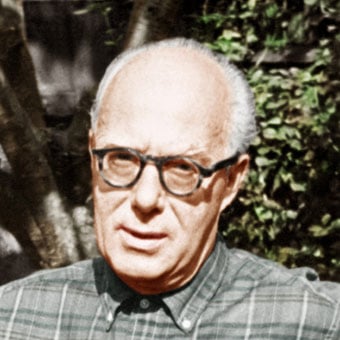
Roberto Gerhard
d. 5 January 1970, Cambridge
Roberto Gerhard was born in the Catalan town of Valls, and educated in the nearby city of Barcelona. Having studied piano with Granados until the latter’s untimely death in 1916, he spent a further four years studying with the eminent composer and ethnomusicologist Felipe Pedrell. With a song cycle and piano pieces already published in Spain, and a piano trio accepted by one of the leading Paris publishers, Gerhard became in 1924 the first (and only) Spanish pupil of Arnold Schoenberg. After four years with Schoenberg in Vienna and Berlin, Gerhard returned to Barcelona and devoted all his energies to propogating new music and establishing links with the literary and artistic avant-garde in Catalonia.
Publicly identified with the Republican cause throughout the Spanish Civil War, both as musical adviser to the Minister of Fine Arts in the Catalan Government and as a member of the Republican Government’s Social Music Council, he left Spain shortly before Barcelona fell to the Nationalists, and after a brief stay in Paris, settled in Cambridge, England. Beginning with the first version of the ballet Don Quixote and culminating in The Duenna, Gerhard’s entire output during the 1940s was explicitly related to aspects of Spanish and generally Catalan culture. The BBC’s broadcasts of The Duenna and the 1950 Covent Garden production of Don Quixote attracted much favourable attention in the United Kingdom, and Gerhard’s reputation began to grow throughout the 1950s, though not in his native Spain, which was in effect closed to him. It was only in the 1960s that he at last achieved a genuinely international reputation on both sides of the Atlantic; and today he is widely regarded as the natural successor to Manuel de Falla.
Roberto Gerhard is published by Boosey & Hawkes.
This biography can be reproduced free of charge in concert programmes with the following credit: Reprinted by kind permission of Boosey & Hawkes
